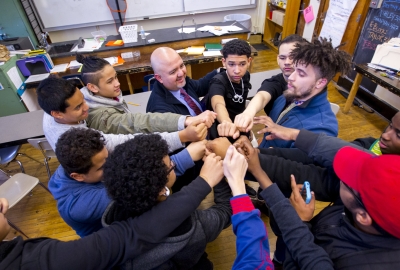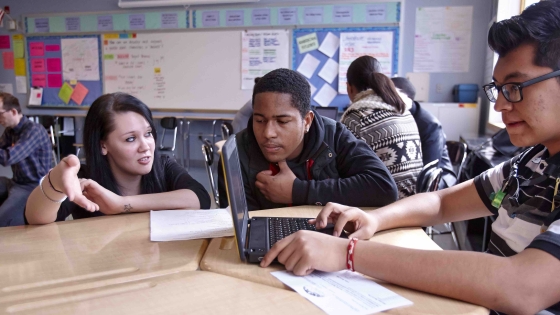
Building Teacher Capacity to Interrupt Racism in Schools
Studying the Work of the Center for Racial Justice in Education
Adriana Villavicencio, Kathryn Hill, and Sarah Klevan (October 2020)
Like other institutions, the country’s education system is challenged by systemic racism. Sixty-five years after Brown v. Board of Education, schools remain largely segregated by race. Predominantly White school districts receive far more funding compared with districts that serve mostly students of color. Black and Brown children are more likely to be suspended than their peers for the same infractions, and research shows that non-Black teachers often have lower educational expectations for Black students than White students.
The Center for Racial Justice in Education (CRJE, formerly Border Crossers) is one of a growing number of organizations working to combat racism in schools. Its mission—to train and empower educators to dismantle patterns of racism and injustice in schools and communities—is executed primarily through intensive training and coaching with K-12 educators, nonprofit organizations, and parents. In 2017, CRJE engaged the Research Alliance to study two of their core program offerings. The first, Talking about Race (TAR), is a one-day workshop that aims to deepen educators’ knowledge about the history of race and racism in the US; strengthen their understanding of how racial bias affects their lives, their teaching, and their students’ lives; and help educators identify anti-racism educational practice. The second was a new, year-long program called Racial Justice in Schools (RJIS), which was designed to provide more sustained coaching and support around the creation of racially equitable learning environments.
Drawing on surveys and interviews with participating educators, as well as program and meeting observations, our report to CRJE presents findings about both programs, including:
-
Most teachers rated TAR training highly. Nearly 85 percent of participants reported that the training was valuable overall; 79 percent said the information presented was useful for their work; and 82 percent would recommend this training to other educators.
-
TAR training shifted knowledge and understanding about race and education. Teachers described gaining a shared terminology on race and racism, increased awareness about the history of racism and its various forms, increased reflection about their own role in racism, and increased willingness to act and address racism in their schools and classrooms.
-
Training was met with small but vocal resistance. While most teachers responded positively to the training, a small but vocal minority of White teachers took issue with aspects of the TAR training (e.g., by espousing a colorblind ideology and dismissing the existence of racism in their schools).
-
In its pilot year, RJIS programming led to some changes in school practice. Our findings suggest that participation in RJIS led to a new understanding of race and racism and a needed common language among school staff. At one of our case study sites, this appeared to be the foundation for more concrete changes in school practice (e.g., a curriculum audit, changes in disciplinary actions, equitable classroom observations). However, this did not appear to be true at the other site we studied.
-
Internal and external conditions shaped RJIS implementation and results. Key factors that appeared to promote the success of RJIS programming were the commitment of school leadership, teacher buy-in and capacity, and the quality of the partnership between the school and CRJE.
The study is supported by a grant to the Center for Racial Justice in Education from the W.K. Kellogg Foundation.

